Seeking asylum: The nightmare vision for Uganda's Asians
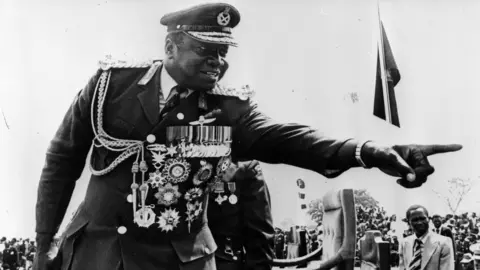 Getty Images
Getty ImagesThe stories of five people who fled persecution in their own countries and found sanctuary in Wales are being told via a virtual reality exhibition in Cardiff. Sudha Vyas's life was turned upside down when she and thousands of others had to flee Uganda.
In 1972, or so the story goes, an important man had a dream. Not an inspiring dream like Martin Luther King, but a vision that would spark one of the cruellest episodes of the 20th Century.
The man was General Idi Amin, ruler of Uganda in Africa. The dream itself - where he was told by God to cleanse his country of foreigners - may just be an urban myth spread by his supporters, but his actions were real. Out of the blue he ordered all people of south Asian origin to be expelled from the country, or face concentration-style camps.
This meant tens of thousands of people who had settled in the former British colony, carved out careers and raised their families there, had just three months to get out.
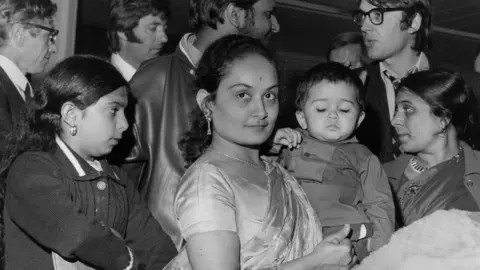 Getty Images
Getty ImagesFor Sudha Vyas, the situation was bewildering. She had lived in Uganda with her husband Sunil since 1969. They were both schoolteachers and had a 20-month old daughter, Sapna. She was also pregnant with her second child.
"We had a nice little life there," recalls Sudha. "Our daughter was giving us lots of pleasure and we were having a good time. Then all of a sudden Idi Amin decided that British Asians were fleecing the country. So we were thrown out."
The couple lived a long way from the capital Kampala, and news of the expulsion order from Amin reached them slowly.
"He was a madman," said Sudha. "We weren't sure whether to believe it at first."
But the order was real, and the decision was taken that Sudha, because of health concerns, should leave first with Sapna, while Sunil, who had to apply for a special visa, would follow when he could.
It was a terrible journey, with the torment beginning before Sudha had even left Uganda.
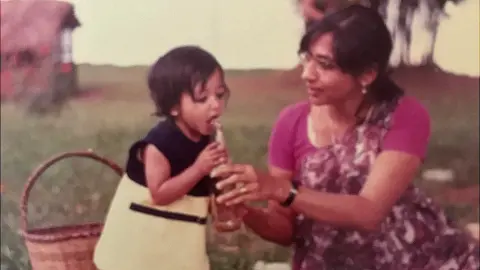 Vyas family
Vyas familyThree times on the journey to the airport her car was stopped by soldiers.
"They all had rifles. They would ask us to open the boot, would rummage through our stuff and take whatever they wanted. Then we had to put it all back.
"I felt scared, unsure. I didn't know if I would see my husband again. I just clung to my daughter - she was my priority."
Sudha boarded a charter flight of a plane owned by the Libyan government. A stopover at a small desert airport on the way to the UK provided a stark illustration of her situation. Sapna was thirsty, it was blisteringly hot, and Sudha had no money. She saw a fellow passenger having a drink and asked if he could spare some for her daughter.
"It was humiliating more than anything, to have to beg for half a glass of Coke when my husband and I had both been professionals in Uganda earning good money," said Sudha.
There was no respite when they landed at Stansted, as Sudha could not afford the two pence fee to use the airport toilet.
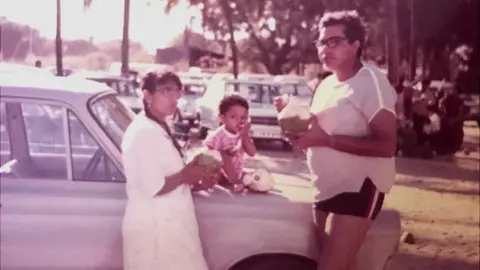 Vyas family
Vyas familyKindness in Cardiff
Sunil had relatives in Grangetown in Cardiff, and it was in south Wales that life began to improve for the Vyas family.
Having managed to reach the UK, Sunil was housed in a migrant camp in West Sussex. Many British households were taking in the displaced Asians, and Sunil heard of a home available in Cardiff for a "small family" and said he would take it. He was given 50p and a train ticket and headed west to be reunited with Sudha.
Sudha says they were helped a great deal in those early days by a couple who had connections at Cyncoed Methodist Church in Cardiff. When news of the new arrivals got round the congregation, Sudha and Sunil got their first taste of Welsh hospitality.
Bags of clothes began to arrive at the family's house. When Sudha came home from hospital having given birth to her second child, a boy named Sangam, there was a chest of drawers full of baby clothes donated by the church waiting for her.
"They [the Harpers] were the kindest people I have ever known in my life," said Sudha. "Even now if I call Elaine she comes to help me."
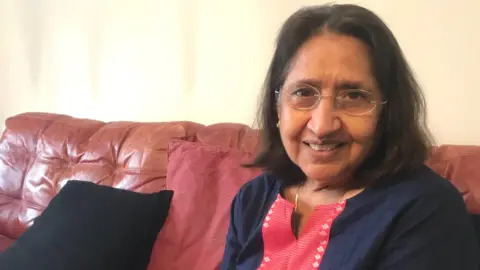
Heart of the community
Sudha got a job working for the Inland Revenue, while Sunil - whose degree was not recognised in the UK - drove buses for a living. It was a dangerous occupation: Sudha recalls there were plenty of attacks on drivers by late-night drunks. Eventually the couple decided to buy a corner shop and house near the University Hospital of Wales in the Heath area of the city.
The shop became the focal point for the local community. Although it closed long ago - it's now the lounge of the family home - Sudha says people still stop her in the street and say they miss it.
"It was hard work but we survived," she said.
"I would come home from work and my husband would ask me to take over at the counter. He would say 'I have to take this lady her cat food' or, 'We need to get Sangam to go get fish and chips for someone'.
"Although we didn't make a lot of money we touched a lot of peoples' hearts, and we made enough for ourselves and to educate our children."
Sunil sadly passed away in 2017, and the children now live in London. Sudha may join them one day, but says it will be hard to leave the city that made her family feel so welcome, and where she has so many friends - including at the local Hindu temple where she worships. Despite the highs and lows of her life, she says her faith has remained strong.
"I am a very, very strong believer and I never stop praying. I have a very strong belief my prayers are always answered," said Sudha.
"Sometimes delayed, but always answered."
The Freedom 360 exhibition with the Welsh National Opera will run from 7 to 30 June at the Wales Millennium Centre in Cardiff. Visitors will be able to experience the stories of persecuted people from across the world who have found sanctuary in Wales.
